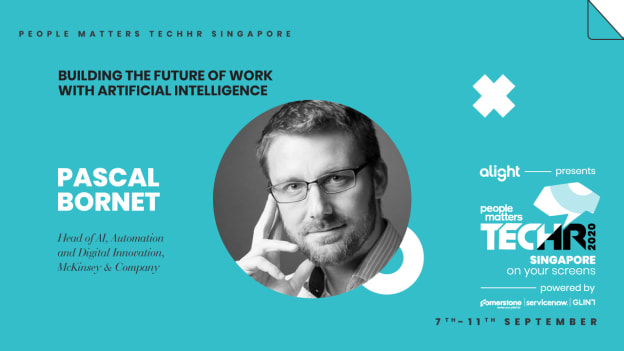Building the Future Of Work with Artificial Intelligence

Pascal Bornet is Head of AI, Automation and Digital Innovation at Digital McKinsey. A renowned thinker and researcher in the field of intelligent automation, Pascal has over twenty years’ experience in digital transformation and is extremely passionate about making our world more human using AI. Pascal joined us at TechHR 2020 to talk through the five main levers necessary to build the future of work through AI (“The Fivefold-A Artifact”).
Before looking into how AI can help us move forwards, Pascal outlined the main challenges facing the global workforce:
Employee Experience
According to Gallup, more than 85% of professionals around the world are not fulfilled by the work they do, Pascal outlines. “It’s too repetitive, it’s too manual, too tedious,” he says. In addition, only a third of workers report they have the appropriate tools to be able to perform their work to the best of their ability.
“For the past ten years, we’ve heard a lot of companies talk about customer experience. Now, I think it’s time to talk about the employee experience,” Pascal says. “Employee experience will become more important, more significant and have more impact on companies than customers - or at least equal impact.”
According to a recent Harvard Business Review, companies that take care of the employee experience are four times more profitable than those that don’t. Clearly, Pascal says, this is a critical issue. “On the other hand, according to the International Labor Organisation, work is causing more than 2.8Mn deaths a year. It’s creating these as a result of the stress that it’s causing,” Pascal says. Death by work-related stress is happening four times faster than before.
COVID-19 & Remote Work
As Pascal points out, “no workers had as part of their education the notion of how to work remotely, but nowadays we have more than 1 billion workers working remotely. We’ve never been trained for that. We’ve never been educated to do that. Because of that, it’s creating isolation. I’ve seen a lot of workers lacking support. Workers having constant distraction, lack of connection, becoming anxious about their future. As a result, all this results in a lack of motivation, a lack of efficiency, and a lack of work-life balance grows worse and worse. All this creates stress and impacts physical and mental health. We’ve seen millions of people getting more and more troubled because of this reality.”
The Economic Downturn
More than a billion people are currently at risk of losing their jobs due to the economic downturn spurred by COVID. “Here, also, AI can help and solve our disconnect.”
In his presentation, Pascal asked: “how can artificial intelligence, which is the most powerful technology of our time, help to solve those challenges?” To do this, Pascal has highlighted five key levers available to build a better future using AI:
The Fivefold-A Artifact
Analysis
“Analysis AI helps us to analyze and understand what people and workers are doing. It helps us to identify the opportunities to help us work better.”
Pascal points to the example of the Fitbit or Smartwatch, helping us to “take the pulse of our lives.” These solutions do the same thing, collecting data about what we do in our day using applications, calendars, and how we manage our meetings. “These applications are able to create personalized dashboards and through those dashboards, help us to manage and monitor our work-life balance, reduce our stress, and improve our professional behavior over time.”
On the market, some vendors currently offering such solutions include Worklytics, Workplace Analytics and Time Doctor.
Automation
“AI helps us to identify and automate the work that is tedious. This is one of the key challenges to employee experience. We are spending a lot of time building reports, clicking here and there, doing the same thing every day such as logistics tasks. We need AI to help us take those tasks and automate them and focus on enjoyable, value-added activities,” says Pascal.
Abandonment
Abandonment encompasses “all those tasks that we do in our daily life that do not correspond to best practices,” Pascal says. “Two words: Emails and Meetings. I think all of us need to restrict the volume of those two elements.”
Through these AI solutions, we can decrease and eventually remove the amount of time we spend on these non-productive tasks. According to Pascal, we can think of these types of solutions as “virtual coaches,” that help us to get better every day. One such technology is MyAnalytics from Microsoft.
Augmentation
“AI that is able to increase the added value of the work we perform. It can do that by working hand-in-hand with us. AI allows us to become superhumans, helping us to analyze millions of data points in a matter of seconds, and improving the quality of our decision-making.”
According to Pascal, this is where the future focus of work ought to be: on those activities that are augmented by AI and technology and where AI and people are working together to deliver the highest outcomes for companies and clients. Examples of such technologies are Aera and Pega.
Anchoring
“Connecting the different actors on the market of work: employees, companies, market players,” Pascal says. “By making these connections closer and more intelligent, AI can help us solve a lot of issues. I’m not only talking here about unemployed people finding employment - which is a great thing - but also a system that helps to connect workers who need to be retrained with the right education centers. I’m thinking about a system that is able to support a system like universal basic income to reduce inequalities between people.”
The possibilities are endless when it comes to leveraging AI in order to create a more efficient, healthier, happier, and healthier workforce. When it comes to supporting the world’s workers, the stakes are now higher than ever.
















